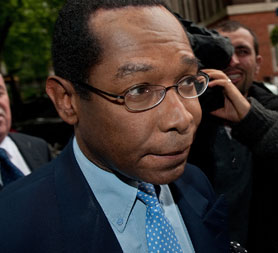Ex-Conservative Peer denies expenses fraud
Former Conservative Peer Lord Taylor of Warwick appears in court accused of falsely claiming more than £11,000 in subsistence and travelling expenses reports Katie Razzall.

Lord Taylor was Britain’s first black Peer. Today he became the latest Parliamentarian to appear in court in relation to his expenses.
Lord Taylor is accused of six counts of false accounting. In layman’s terms, he’s standing trial for £11,000-worth of expenses claimed for subsistence and travel between 2006 and 2007 which the prosecution says were false.
The trial was unusual from the start. The Judge, Mr Justice Saunders, apologised to the jury for his “headmasterly approach”, before giving them directions almost unprecedented in their length. He spoke for many minutes telling them the case was one of a series of expenses-related cases that were very high profile. He warned them to ignore everything they’d read or heard. He told them everyone would have a view, so they must talk to nobody.
He also warned them of the dangers of social media: “Do not announce on Facebook or Twitter that you are on this jury,” he said, “as you will simply invite comment – and do not reveal your impressions of the case.” This would be contempt of court and you could be sent to prison, he told them.
“The prosecution says he must have known it was false, deceptive and misleading, that what he was doing was dishonest.” Prosecution counsel Helen Law
Unusual too was the opportunity given to the defence to open its case to the jury. On the whole, it’s only the prosecution that makes statements at the start of a trial. But this is no ordinary trial, given the heightened public awareness and often anger at the subject.
The case, according to the prosecution, is simple. Lord Taylor lives in London, yet – he told the House of Lords authorities – his main residence was in Oxford. That enabled him to claim what’s termed “overnight subsistence” to contribute towards the costs of staying in London on parliamentary business. He also claimed mileage expenses for the journeys he says he made. In fact, the Oxford home belonged to the partner of his step-nephew and Lord Taylor never stayed there.
“The prosecution says he must have known it was false, deceptive and misleading, that what he was doing was dishonest…Why? Because it was obvious he wasn’t entitled to make the claims,” said Helen Law for the Crown.
According to the rules at the time, Peers – none of whom receive a salary – are entitled to claim money for the costs of a hotel or a second home, if their main residence is outside London (back in 2006, the money allowed for “night subsistence” was £154.50 for every day of attendance at the House of Lords).
“Let us not make John Taylor a scapegoat.” Defence counsel Mohammed Khamisa
Interestingly, Lord Taylor agrees he never lived in Oxford, never had any financial interest in the Oxford house or ever went there. His defence is that it was “common practice” for Lords to make claims for homes outside London to which they had some familial link, in order to make up for the fact that they weren’t paid to be Peers.
Lord Taylor’s defence counsel, Mohammed Khamisa, told them his client was an honest, upright public servant, who never knowingly made false claims. “Let us not make John Taylor a scapegoat”, he told the jury, for a claims system that was “commonplace”.
“He understood he could designate any address providing he had some familial link. He genuinely and honestly believed… it was permissible to do that.”
Lord Taylor is pleading not guilty and will take the stand later in the week.




